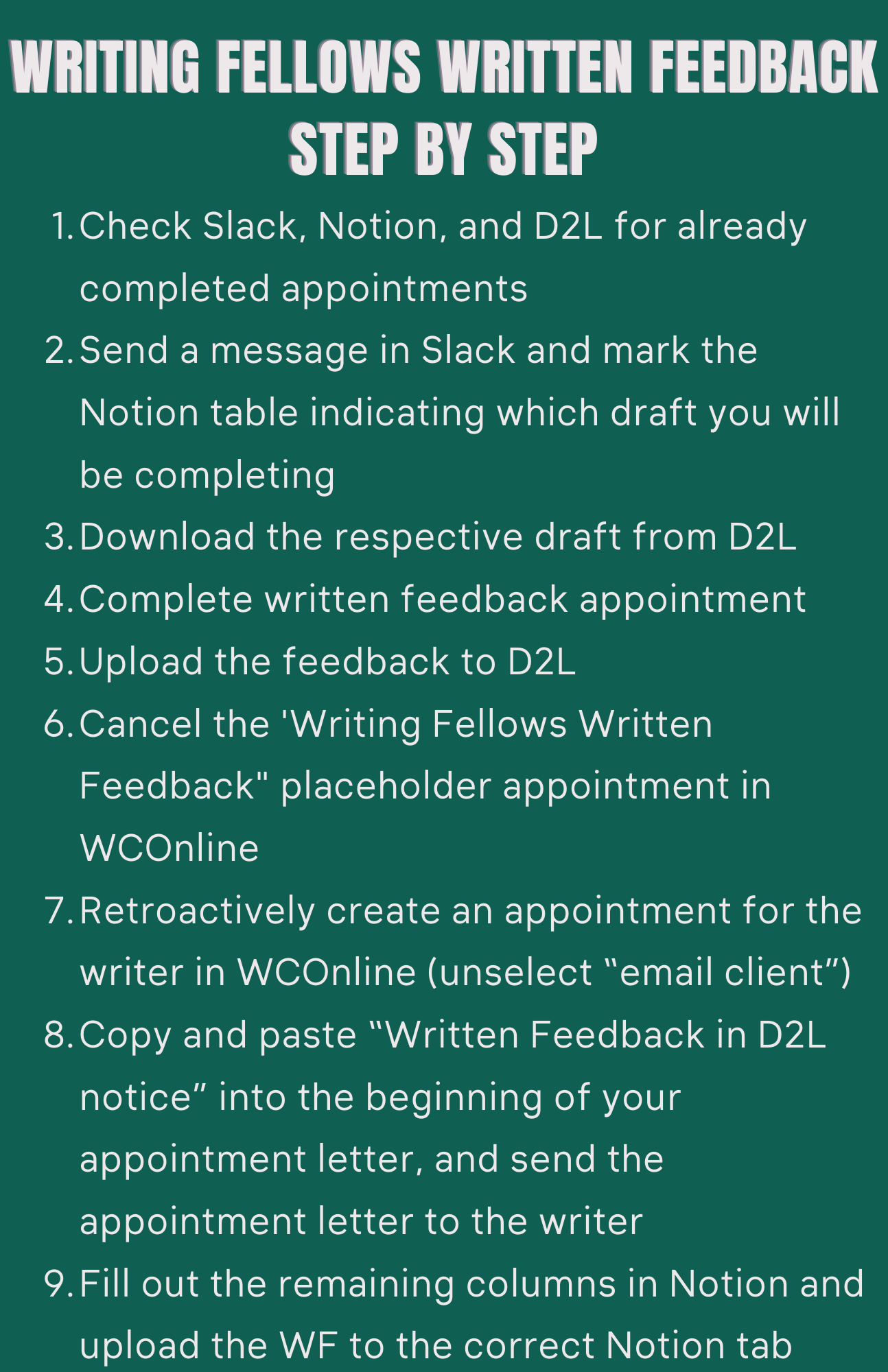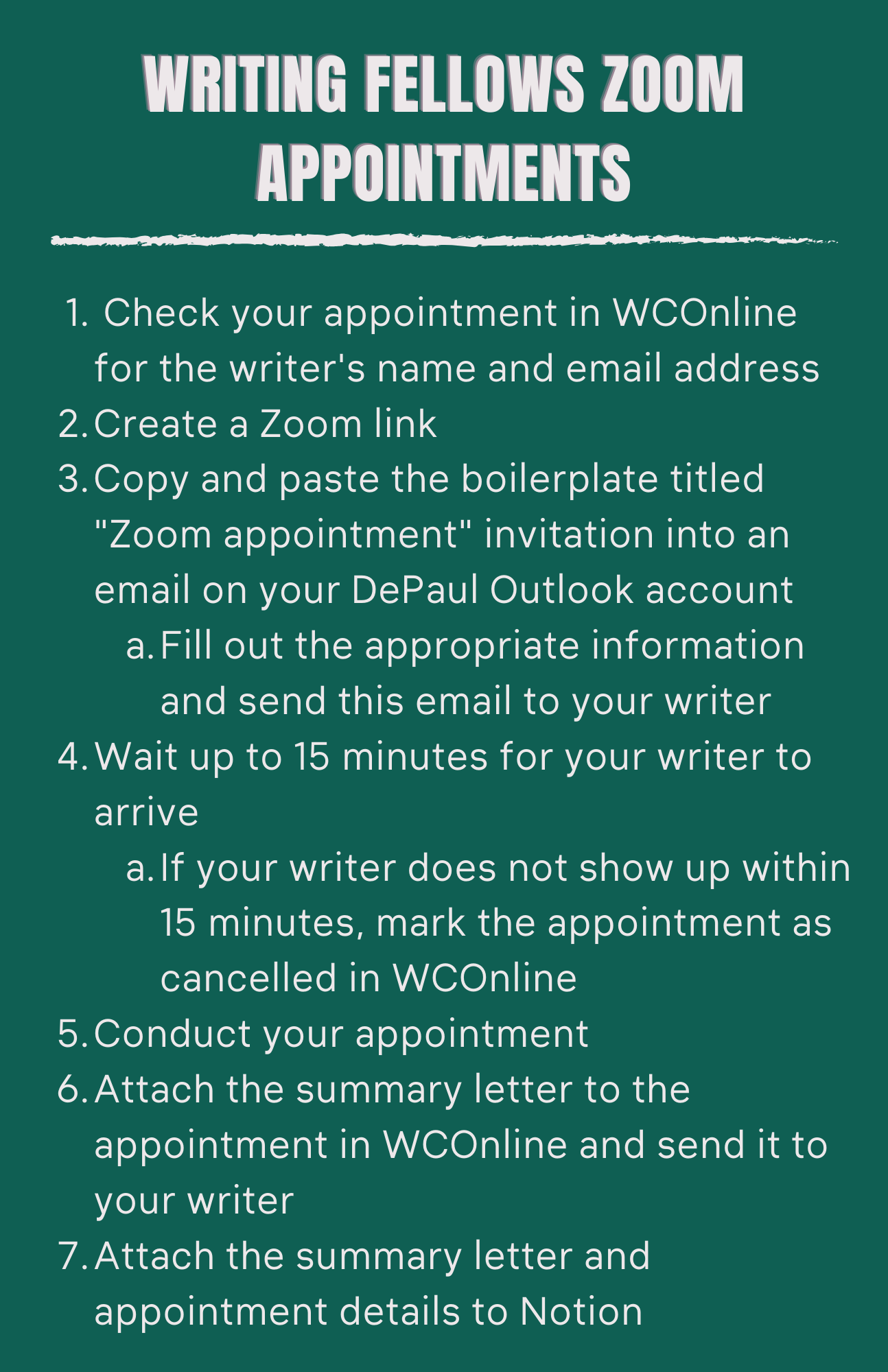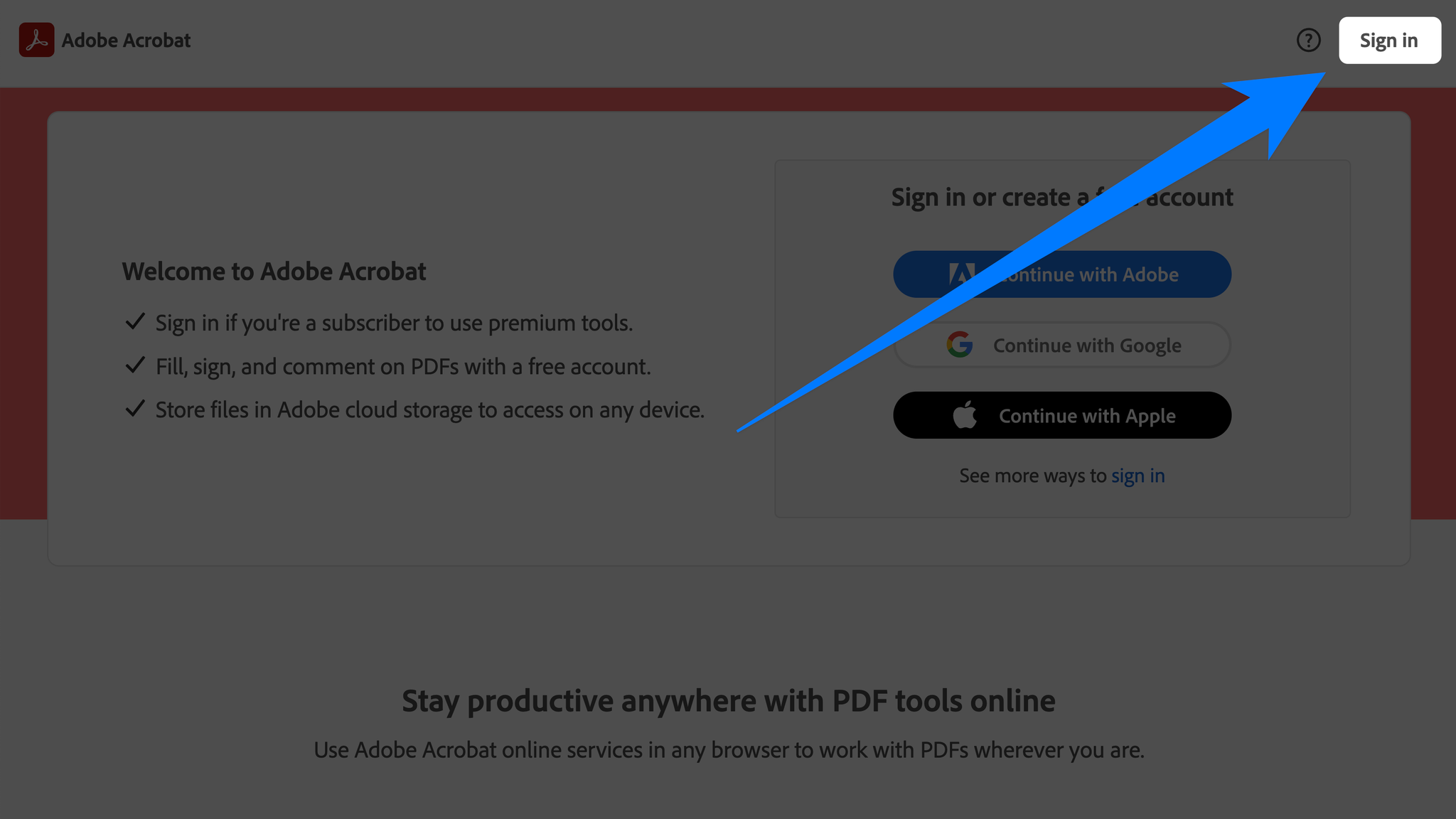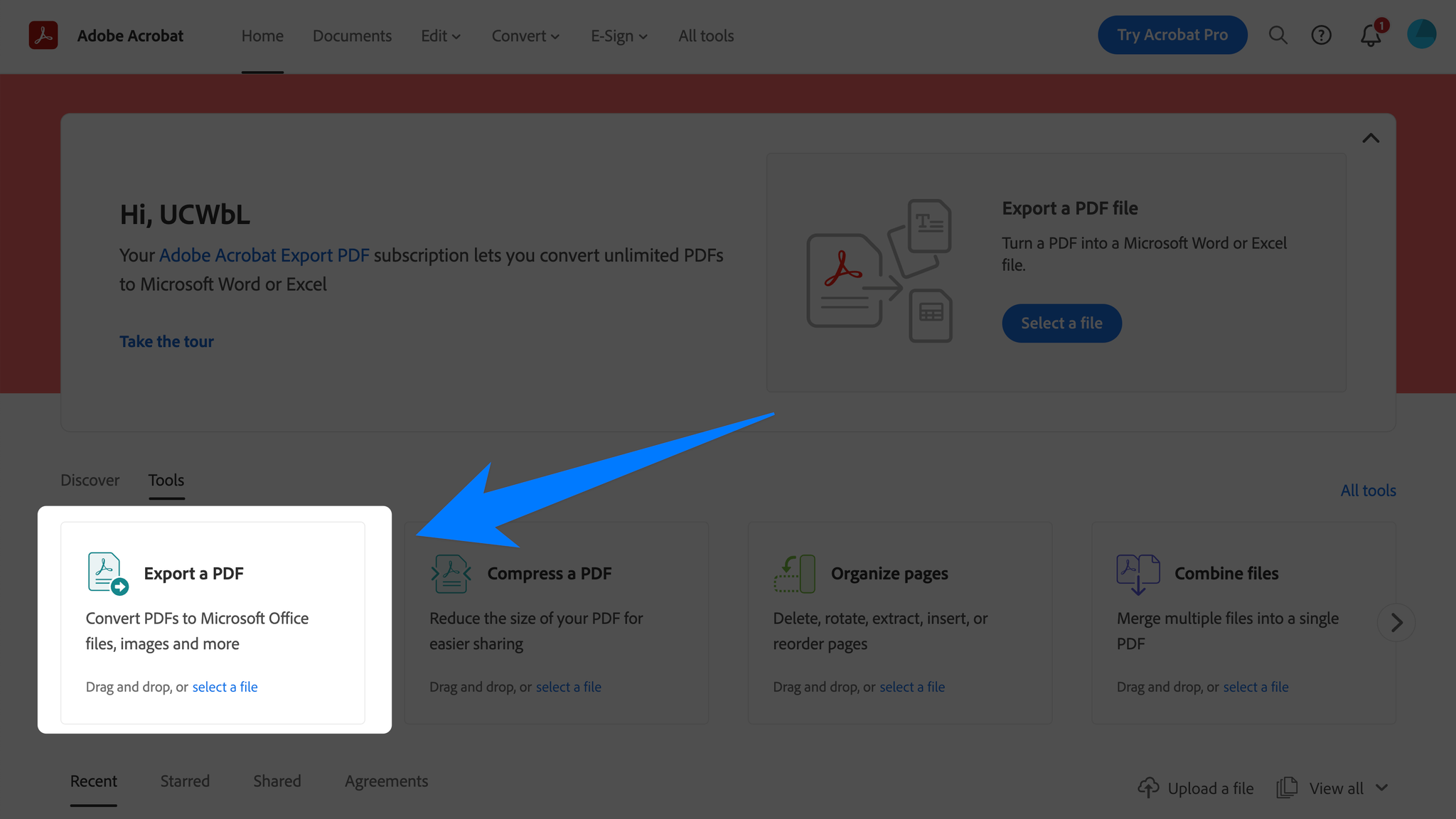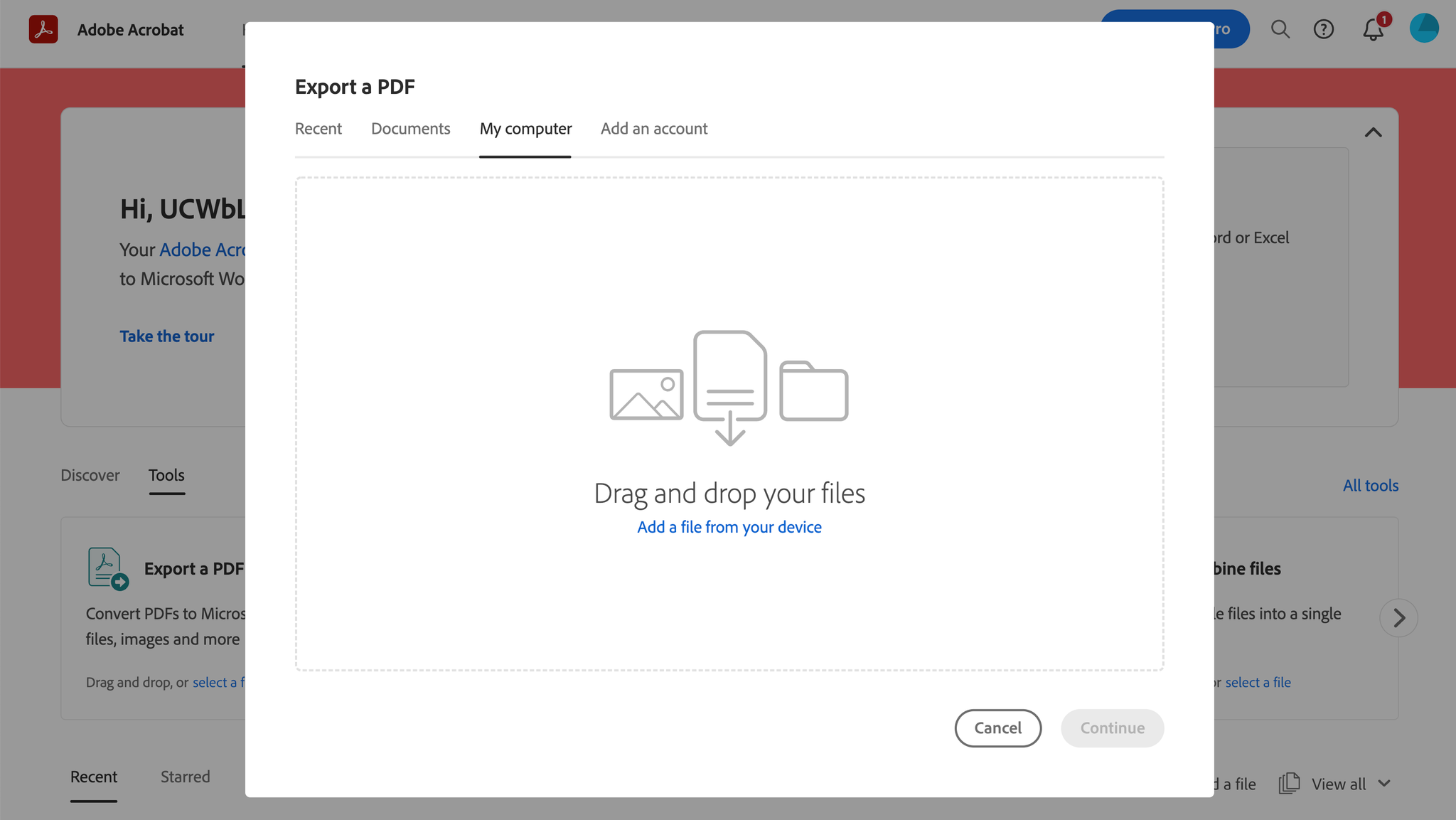👩🏽🏫 Introduction
Some instructors build time into their course syllabus for drafting and revising projects and require all students in their course to work with the peer writing tutors in the  Writing Fellow program. Writing Fellows meet with instructors periodically throughout the quarter to best help students succeed in particular assignments and focus on specific writing goals.
Writing Fellow program. Writing Fellows meet with instructors periodically throughout the quarter to best help students succeed in particular assignments and focus on specific writing goals.
Writing Fellows serve as authentic, interested readers for writers and help writers find and engage in writing processes that allow them to produce thoughtful final drafts. The Writing Fellows assigned to each course are a cohort, and each cohort works closely with their course instructor to help writers with any genre of writing in any course across DePaul University.
🗣️ Program Mission
The Writing Fellows program manifests our core belief that "all writers, no matter how accomplished, can improve their writing by sharing their work in progress and revising based on constructive criticism." To that end, Writing Fellows work to share the benefits of revision-oriented feedback in the writing process.
Building on the belief that all writers, regardless of experience or skill level, can benefit from revising their work, the Writing Fellows program helps instructors incorporate peer revision into coursework and class expectations. Tutors give feedback to students in cohorts ranging from LSP 100 classes to Doctoral-Level courses. All tutors are fully capable of giving feedback to any writer!
⚔ Writing Fellow Nomenclature
Cohort
A cohort consists of tutors that are working together as writing fellows on a class. There can be anywhere from 2-10 tutors in a cohort.
Fellow
That’s you! A writing fellow is just the name we use to refer to the tutors that are assigned to a class in this program
Assignment (written feedback, zoom, combo)
Each assignment you give feedback on will either be a written feedback or a Zoom appointment. Sometimes in a quarter, you will conduct appointments using both modalities. We use Zoom instead of WConline for writing fellows because most students and professors are already familiar with this software and know how to use it. Each assignment can have up to 2 rounds of feedback, meaning courses with 2 assignments can potentially call for a total of four rounds of feedback. However, many cohorts will have only two rounds for feedback. The number of rounds for each assignment will be negotiated with the instructor and the writing fellows coordinator
Point of Contact
The point of contact is the person who organizes your cohort - they will be either one of the Writing Fellows Student Managers or the Coordinator. These folks set up the Slack channel, lead meetings, communicate with the professor and the students as well as sign up students for Zoom appointments. This is the person you should go to with any writing fellows questions you may have throughout the quarter. They should introduce themselves at the beginning of the quarter when your fellowing begins (this could be anywhere from week 2 to week 6 of the quarter)
Writing Fellow Student Manager
These are the people who help run the writing fellows program with the writing fellow coordinator and can be your point of contact. To view who these people are, visit the notion handbook page on Writing Fellows.
Notion
Notion is the tool we use to keep track of participation in writing fellows, keep note of instructor meetings and this is the hub of information for your cohort.
Instructor Meeting
This is a meeting that fellows will conduct to chat with the professor about each assignment before the beginning of a round to get a sense of what the expectations are for that class and for that round of feedback. This is one of the huge benefits of being a writing fellow. You get to have access to information you normally would not get in a regular appointment!
Cohort Hour
This is the meeting time blocked off for you and your fellow tutors in a cohort. This is when you will meet either in-person or online with your point of contact for the initial meeting to accomplish initial tasks, for check-ins after each round, and for the end of the course to talk about how things went. This is a specifically allotted time that you overlap with your Point Of Contact on the schedule so that you may communicate with them as easily as possible even if there is no cohort meeting.
📚 Components of Writing Fellows
The organization of a Writing Fellows quarter can vary from course to course because each course and instructor will have different requirements and needs based on their assignments.
A typical Writing Fellows’ quarter will involve 1 to 2 assignments. Each assignment may have 1 to 2 appointments known as rounds.
The modality of the appointments you and your cohort will conduct will depend on the needs of the class, and your cohort will be labeled as one of the following:
- Written Feedback Fellowing (Only Written Feedback)
- Synchronous Fellowing (Only Zoom/FtF)
- Combo Fellowing (Zoom/FtF and Written Feedback)
You will receive all information about your Writing Fellow quarter during your first cohort meeting, including what the structure of the quarter will be.
Reflecting on Assignment 1 & Preparing for Assignment 2
After Assignment 1 but before Assignment 2 begins, you and your Writing Fellows cohort will meet with the course instructor to discuss and reflect on Assignment 1 with them. You also have this second meeting with the Instructor to discuss the next assignment and the new agenda points to cover for that round of fellowing.
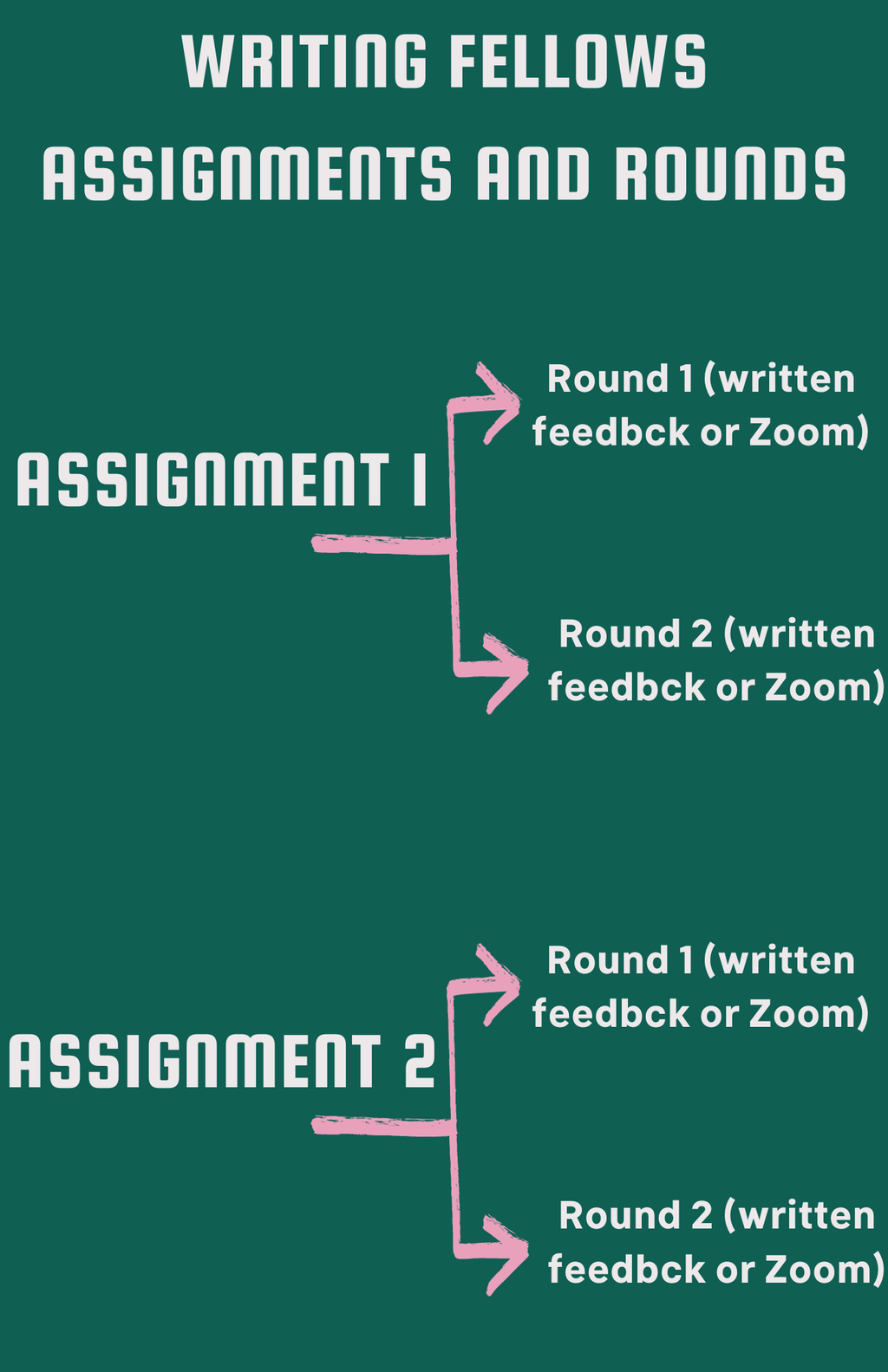
👩👩👦👦 Cohorts
So that you can conduct critical work and maintain an open dialogue with one another about your experiences, you and the other members of your Writing Fellows cohort will be blocked off for cohort hours throughout quarter. In most cases, you and your cohort will be blocked off for one hour each week your cohort runs. These meetings help you and your fellow members of your cohort to stay organized and on the same page.
Making the Most of Your Cohort Hour
For cohort meetings before and after you begin feedback, your Point-of-Contact will lead you through the tasks you need to complete. You will also check in with your point of contact after each assignment to chat about how that round went.
Often, your POC will delete any unnecessary cohort hours to free up your schedule. If you are unsure as to what you should be doing for an upcoming cohort hour, just slack your point of contact to check in!
📄 Boilerplates for Fellows
Writing Fellows will use a variety of boilerplates to guide your language when sending emails to classes and instructors. Pay close attention to who should be CC’d on each email and who the recipient is. These boilerplates are the copy of the emails that you will fill in with specific information about your cohort. You can find these boilerplates in the Tutor Resources on the Notion page for your cohort.
🤗 Expectations
👥 Communicate Effectively
Effective cohort collaboration comes down to one thing: communication. Slack, Zoom, and Email are the three main means of communication used for Writing Fellows. All communication with your cohort and POC within the Writing Center will be conducted through Slack, and meetings will be held on either Zoom or Slack huddles. All communication with students and professors outside the Writing Center will be conducted through your DePaul email, and meetings will be held on Zoom.
Communicating with your Cohort
Most of the time, you will collaborate in person or over Zoom with the other Writing Fellows in your cohort during your paid work shifts. In addition to your cohort meetings, it is important to stay in contact with your cohort members regularly.
Communicating with the Writing Fellows Student Managers & the Writing Fellows Coordinator
The  Writing Fellows Student Manager (WFSM) (s) and the Writing Fellows Coordinator are responsible for scheduling and managing all Writing Fellows cohorts. They are happy to help you address any questions and concerns that you may have.
Writing Fellows Student Manager (WFSM) (s) and the Writing Fellows Coordinator are responsible for scheduling and managing all Writing Fellows cohorts. They are happy to help you address any questions and concerns that you may have.
Because the Writing Fellows program only works well when Writing Fellows in a cohort work effectively with one another and the course instructor, Writing Fellows Student Managers will check in with each cohort before feedback begins to make sure you are building a solid foundation for good collaboration and to address any issues.
During these check-ins, you’ll discuss how to conduct the initial instructor meeting and address any questions, comments, or concerns that may have come up with the process so far. Talk about your expectations for your assigned course and the goals you hope to achieve with your group of writers.
Remember that the Writing Fellows Student Managers and Coordinator are here to support you. Please reach out to them if you ever have any questions!
✅ Check In
There may be times when issues arise that need to be addressed before your next meeting, be sure to check Slack and your DePaul email when you clock in for your shift, even if you are not scheduled to do any fellowing that day.
For communication within your cohort, you will have your own private Slack channel. You will also be added to the #writingfellows Slack channel for general communication.
When checking your email, should a writer from your cohort email you directly, forward this email to your point of contact and Slack message them to discuss the best way to respond to the writer. Also, be sure to forward any scheduling emails to your point of contact and Slack them directly.
🧑💻 Keep Occupied
If you find yourself without a Writing Fellows appointment, complete any outstanding Fellowing-related tasks, such as forwarding student emails to your Point-of-Contact, reaching out to your Fellowing Point-of-Contact with any questions, updating the Participation Report, etc.
If you do not have any Fellowing work to complete, check your schedule to see if you’ve been assigned work by a director, coordinator, team leader, receptionist, or other Writing Center Leader. If not, unblock your Fellowing time on WCOnline so that you are available to meet with writers. If a writer does not schedule an appointment during this time, do Sidework.
📝 Written Feedback Step-by-Step
Step-by-step (written)
Step-by-step (graphic)
💻 Zoom Step-by-Step
Step-by-step (written)
Step-by-step (graphic)
🧑🔧 Troubleshooting
A Writer Submits a Draft as a PDF
A Writer Misses an Appointment
A Writer Tries to reschedule
A Writer Submits a Late Draft

